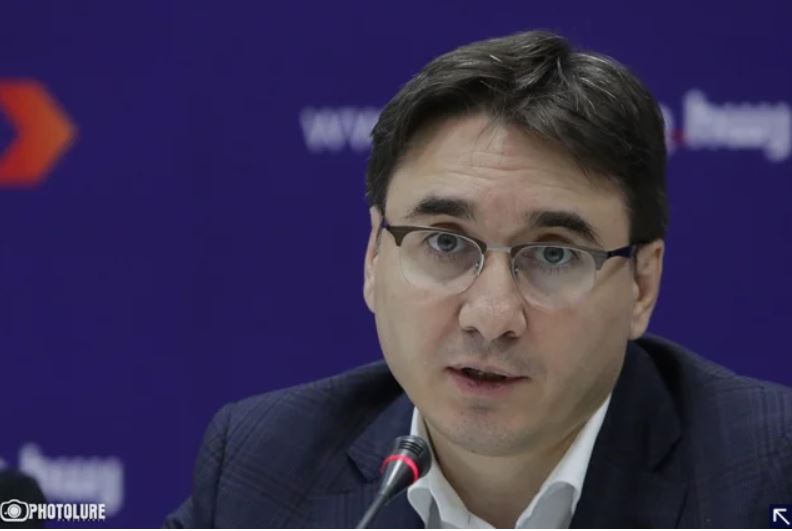Armen Gevorgyan’s Speech at Meeting of Interparliamentary Commission on Cooperation between RA National Assembly and RF Federal Assembly
Armen Gevorgyan gave a speech during the discussion on the topic “Cooperation between Armenia and Russia within the framework of the Eurasian Economic Union, including the development and digitization of IT technologies” at the 35th meeting of the Interparliamentary Commission on Cooperation between the National Assembly of the Republic of Armenia and the Federal Assembly of the Russian Federation in Krasnoyarsk on July 11. In particular, it is said in the speech:
“Dear colleagues,
Since the adoption of the statement on the EAEU Digital Agenda, the member states have come a long way in the introduction of digital technologies in the national public administration and economy. It is important that the efficiency of the introduction of digital technologies has not fallen during the pandemic, and we have witnessed new projects. At the same time, we need to recognize that the pace and results of work on the digital agenda are very different in our countries. In preparation for this meeting, I got acquainted with the report on the implementation of projects within the framework of the EAEU Digital Agenda for 2022. Unfortunately, I should note that in that report I did not see any data on the effectiveness of projects aimed at digitizing integration mechanisms. I think that it will be useful, based on the results of our work, to propose the EAEU Commission to develop and introduce the so-called key performance indicators of the digital agenda, according to which, It will be possible to determine the quantitative and qualitative parameters of the impact of digital projects on the growth of trade turnover between our countries, on the growth of the GDP of our union taken as a whole and individual sectors of economy, on the increase in the competitiveness and quality of products manufactured in our countries, on the deepening of industrial and other cooperation.
Read also
Today, the new global and geopolitical realities that have emerged have also been added to the existing objective problems of the digital agenda. In this new environment of relations, in my opinion, two essential aspects of cooperation in the field of digital technologies become relevant: the first is the strengthening of the bilateral component of cooperation, I mean the Armenian-Russian cooperation, and the second is the relationship between new challenges in the field of national security and the digital agenda for development.
Leading areas of joint research can be the “neutralization of digital risks” for national security and the “digital transformation” of the military-industrial complex of our countries.
It is already obvious that we will deal with cyber terrorism, cyber weapons and cyber war in the new world order. These issues have become more relevant for Armenia after the 44-day war. Our joint efforts on issues of information technology security should be doubled both in terms of ensuring the maximum effectiveness of the peacekeeping forces in Nagorno-Karabakh, in the face of increasing rejection of their presence by the Turkish coalition, and ensuring the territorial integrity and inviolability of the borders of the Republic of Armenia.
The traditional and only producer ensuring the state sovereignty is the military-industrial complex, because the state occupies a central place in the activity and development of this complex. Undoubtedly, the defense industry is one of the leaders of technological progress around the world, including in the field of information technology. The enterprises of the military-industrial complex should ensure the “digitization” of their own production in order to be able to integrate into the “digital economy” and correspond to the level of development of management technologies in other sectors of the economy. The successful conduct of military operations requires timely comprehensive information support. That is why the emergence of the “digital economy” is a challenge for the military-industrial complex.
Colleagues, the launch of the Armenian-Russian “comprehensive digital competitiveness” can help to adequately and effectively meet the mentioned challenges through multilateral cooperation, based on the existing joint and national military-industrial associations, scientific research platforms and a large number of qualified human resources. At the level of interstate cooperation, it is possible to define the problem of ensuring the stability and security of the information and telecommunication infrastructures of our countries at all levels of the information and digital space, including within the framework of the unified systems of interaction and management of the EAEU and CSTO.
Such an initiative will also be important for the development of the spheres of education and science. The Republic of Armenia can become a unique scientific laboratory, where rather daring and extraordinary scientific researches and experiments can be carried out, where laboratory workshops and start-up productions can be created together with Russian investors. In addition, digital cooperation between our countries within the framework of the military-industrial complex can maximally promote the policy of defense-industrial self-sufficiency of Armenia, which will minimize the dependence of the country on external factors.
In conclusion, I would like to note that the digital cooperation between our countries can objectively form a new quality of Armenian-Russian integration and open new perspectives for its deepening.
Thank you for your attention,” Armen Gevorgyan concluded his speech.
National Assembly of the Republic of Armenia






















































